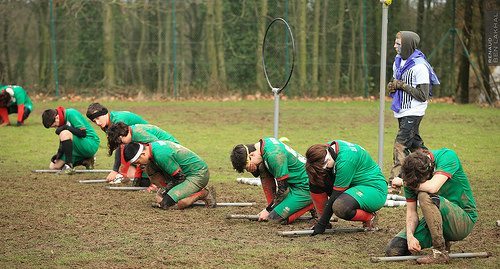Quidditch could revolutionise university sport
Seven players line up at the three hoops, brooms at the ready. The referee’s eagle eyes scan the pitch one last time before releasing the Snitch and starting yet another exciting game of Quidditch. Yes, you read that right. Quidditch. And I am not just referring to the version on page or screen.
Since 2005, Muggle Quidditch has become a very legitimate sport. While some might feel it a matter of damaged pride that it was not a British university that started the whole thing – the first ever team hailed from Middlebury College in Vermont, USA – there are now over 15 teams that are registered with Quidditch UK, the local chapter of the International Quidditch Association (IQA). And the number is growing each year, with the University of Warwick on the verge of putting together a formal team.
As expected, it is a little different from the version in the books. Sadly, flying is not an option – too risky to cope alongside regular university stress you see – but brooms are still used. As with J K Rowling’s version, teams consist of three Chasers, two Beaters, one Keeper and one Seeker. Chasing and Keeping are easy enough to understand. The former involves passing and shooting the Quaffle through the opposing hoops in order to score points – 10 per goal. The latter involves protecting said hoops.
Beating is a little bit more complicated and different from the original version. There are three Bludgers, not two, and no bats. Instead, the balls are thrown directly at the opposing team to try and disrupt their play. Any player hit by a Bludger must immediately drop whatever ball they have and dismount their broom. They then need to run and touch their hoops before resuming play.
Seeking is also different, for the obvious reason that Golden Snitches are sadly not in abundant supply anymore. A neutral runner is used instead, who keeps the Snitch in their trousers’ back pocket. The Seeker must remove the Snitch from the pocket in order to earn 30 points and end the game. And before you say anything, 30 points is a lot fairer than 150.
Rowling may have invented Quidditch but, like any other sport, it continues to evolve. Indeed, some universities have their own versions that are played in addition to the standard IQA rules with varying levels of complexity.
The biggest draw for players is how accessible the sport is. The Warwick Harry Potter Society’s Quidditch Captain, Charlotte Adcock, has said that the most exciting thing about the sport is that people who might not fit the stereotypical mould of athletes can not only enjoy a game of Quidditch, but can excel at it. And its rules, while seemingly complex, are actually quite easy to pick up. Although the university has not formally registered with Quidditch UK yet, having only formed the purple-clad Warwick Wizards earlier this year, they have already arranged matches with Oxford in Week 8 as well as participating in the national Squirrel Cup. Players from Warwick will also attend the Valentine’s Cup, where individual Quidditch players sign up and then get to play with teams that are formed on the day from different institutions.
A first-year History of Art student, Ms. Adcock hopes that Quidditch is able to establish itself as an integral part of the university’s sporting landscape. She has spoken about how important it is to break the “geeky stereotype” associated with fans of fantasy series and also widen the perception of sports in general – not to mention the fact that Quidditch has become such an indelible part of British culture. Our overseas alliance university, Monash, has a really popular Quidditch team and it is hoped that an exchange can be arranged soon so Warwick can get some pointers.
Ms. Adcock also points out how Quidditch addresses the very serious and often overlooked issue of gender equality in sport. A key requirement for a team to register with the group is that it must have at least two players on the field who identify as a different gender from at least two other players. Crucially, it is the gender the player identifies with that is important, not their biological sex. Because of this, and its strict enforcement, Quidditch is fast becoming a leader of sports for equal basing for both women and the LGBTQ+ community. In fact, as of 2013, the IQA has set up a branch called Title 9¾ which focuses on actively promoting advocacy and awareness, as well as gender equality and inclusivity.
The words, “I’ve got to go, have Quidditch practice” might still raise a few eyebrows now and then. However, with the Harry Potter books having recently been voted the best-loved children’s series of all time, it should not be surprising that the IQA has had such success. Who knows? Maybe Warwick can contribute to a Team GB Olympic contingent in the not too distant future. Just so long as we get a nice, clean game.

Comments